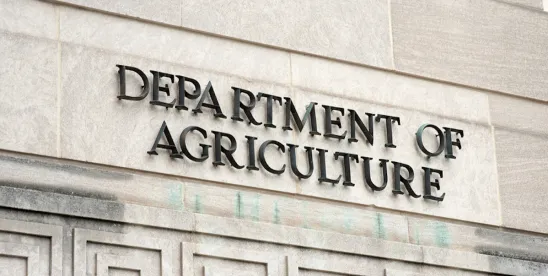- On September 10, 2024, USDA’s Food Safety and Inspection Service published updated guidelines on substantiating animal-raising or environment-related labeling claims on meat and poultry products. Changes to the guidelines are related to updated scientific information, sampling data, online questions and answers, public comments, petitions, and stakeholder meetings.
- Examples of animal-raising claims include “Raised Without Antibiotics,” “Grass Fed,” “Free-Range,” and “Raised Without the Use of Hormones.” Environment-related claims include, among others, “Raised using Regenerative Agriculture Practices,” and “Environmentally Responsible.” These claims are considered “special statements and claims” that trigger the requirement to submit meat and poultry product labels to FSIS for approval before the products may be distributed in commerce. FSIS reviews labels bearing these claims on a case-by-case basis by reviewing the production protocol submitted with the application, which FSIS will approve if:
- The documentation supports the claim made;
- The claim is otherwise truthful and not misleading;
- The claim and any qualifying information is prominently and conspicuously displayed on the label; and
- The claim does not otherwise render the product misbranded under the Federal Meat Inspection Act and the Poultry Products Inspection Act.
- FSIS initially published the guidelines in October 2016 and first updated them in December 2019, when the Agency requested comments specifically on the use of the claim “free range” for poultry products in response to a petition. The guidelines are intended to advise establishments on the type of documentation they should submit to substantiate label claims and reduce consumer confusion regarding such claims.
- In response to comments on the animal-raising and environment-related claims, FSIS stated:
- It would not be codifying any animal-raising claims because of the constant innovation in animal production practices and evolving consumer expectations, which would make it impractical to maintain a list of allowable claims;
- It “strongly encourage[s] the use of third-party certifiers to substantiate animal-raising claims;”
- The kind and amount of supporting documentation depends on the claim and could vary according to circumstances and could include things like detailed written descriptions of processes, signed documents describing how the claim is not false or misleading, and written descriptions of the identification, control, and segregation of non-conforming animals or products;
- It strongly encourages the use of a routine sampling and testing program to test for the use of antibiotics in animals prior to slaughter or, alternatively, third-party certification to substantiate negative antibiotic use claims; and
- Establishments are encouraged to provide documentation such as environmental data or studies to substantiate environment-related claims.
- FSIS further emphasized that it encourages the use of third-party certifiers to substantiate these claims and stated that the Agency is “exploring options to determine whether there are lower-cost third-party certification programs, including those offered by the Agricultural Marketing Service (AMS), that meet the recommended criteria for third-party certifiers included in the revised guideline.”
- FSIS is accepting comments on the updated guidelines before November 12, 2024, under docket number FSIS-2024-0010.
FSIS Updates Guidance for Animal-Raising and Environmental Claims
Tuesday, September 10, 2024
Current Public Notices
Published: 28 August, 2025
Published: 25 August, 2025
Published: 25 August, 2025
Published: 25 August, 2025
Published: 25 August, 2025
Published: 22 August, 2025
Published: 20 August, 2025
Published: 20 August, 2025
Published: 18 August, 2025
Published: 18 August, 2025
Published: 14 August, 2025
Published: 12 August, 2025
Published: 11 August, 2025
Published: 8 August, 2025
Published: 18 July, 2025



 />i
/>i
